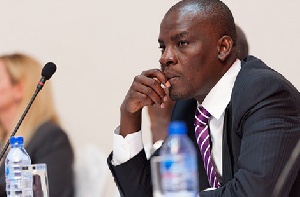Employers would be left with no choice than to lay off workers if Ghana’s current economic condition does not improve in 2016, businesses have warned.
Erratic power supply, high-interest rates, instability of the local currency, and rising cost of utilities have all contributed in raising the cost of doing business in the country.
As a result, some two thousand workers or more - mostly from the mining and manufacturing sectors - have lost their jobs as a result of labour retrenchments since the beginning of 2014.
Director of Research and Projects at the Ghana Employers’ Association (GEA), Charles Asante-Bempong said a recent study carried out by the GEA revealed that the current energy crisis has had a telling effect on businesses with some industries laying off staff, and others working below capacity due to the unreliable nature of power.
He hinted the situation could get worse if the general economic condition does not improve in 2016.
Mr Asante-Bempong was speaking on the sides of a breakfast meeting held by the Association to discuss with industry players its draft Business Agenda document for the 2016-2018 years.
Since the beginning of 2014 till now, many prominent companies in the country have laid off some of their employees while some threatened to do so if the economy does not improve.
This has left the Ghanaian worker worse off than ever.
In the mining sector, where the challenges equally stem from external shocks as they are of nationally, about a thousand workers have been laid off.
Newmont Ghana laid off about 500 workers in 2014 as part of efforts to improve and ensure cost and operational efficiency at its Ahafo Mine. It had in 2013 laid off 240 workers “due to a fall in gold price on the world market and the rising cost of doing business in the last five years.”
In August 2014, AngloGold Ashanti slowed operations at its Obuasi mine by slashing its exploration budget to between US$150 and US$175 million from US$400 million - resulting in the laying off of hundreds of workers.
Goldfields in 2014 also laid off more than 500 employees and announced it would lay off 200 more in March this year in the economic status quo does not improve.
The domestic challenges aforementioned, together with a fall in gold prices on the world market, have had a telling effect on the industry.
Gold prices began 2014 trading at US$1,250 an ounce on the international market and peaked to an all-time high, within the period under review, of US$1,380 in March 2014. The commodity is currently trading at US$1,069.
In the manufacturing sector, Coca-Cola Bottling Company Limited laid off some 98 workers in March this year, from the total 250 it planned to retrench, due to the worsening effects of the current power crisis and the depreciation of the cedi.
Beverage producing company, Blue Skies also threatened to lay off a thousand of its workers in April 2015 if nothing is done to improve the erratic power supply in the country. Cadbury Ghana Limited and Mantrac Ghana laid off 58 and 180 workers respectively for the same reasons.
In the services sector, Novotel Hotel laid off 26 while the African Sun Hotel at Airport City totally folded up totally leaving hundreds of its workers jobless.
A shortage in power supply (deficit of 500MW) from the national grid, resulting in a load shedding exercise by the Electricity Company of Ghana (ECG), has crippled many businesses in its four-year run.
Access to credit and the cost of borrowing have been a major challenge for most businesses in the country. Many of the commercial banks lend at between 28 and 38 per cent per annum even though the central bank currently lends to them (commercial banks) at 26 per cent.
The cost of borrowing is said to rise further as the Bank of Ghana (BoG) continues to increase its policy rate in bid to tighten the country’s monetary policy stance. The BoG policy rate has been increased by 500 basis points in the past year from 21 percent to the current 26 percent.
The cedi has depreciated by about 60 percent against major trading currencies since the beginning of 2014. The currency began 2014 trading at GH¢2.3 to dollar but now trades at GH?3.8.
Utility prices are set to go up by a 100 per cent in 2016 further putting a strain on businesses. Even though inflation has remained relatively stable, cost of inputs has escalated drastically.
According to the GEA the private sector’s role as a key engine for economic development, and an important partner for sustainable and inclusive economic growth, is critical in reducing poverty, and as such should be taken serious.
Despite its contributions to the economy, the fundamental questions regarding how the country’s private sector was being developed to actually boost economic growth and reduce poverty remains unanswered.
Click to view details



Business News of Friday, 4 December 2015
Source: The Finder

















